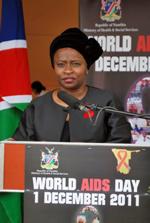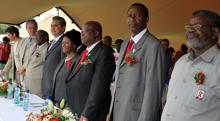World AIDS day 1 December 2011: Statement by Dr Magda Robalo, WHO Representative on behalf of the UN System in Namibia
Thank you Director of Ceremonies,
Mr Kahijoro Kahuure,
Permanent Secretary, Ministry of Health and Social Services;
Honourable Minister of Health and Social Services, Dr Richard Nchabi Kamwi
Honourable Minister of Health of Botswana, Rev. Dr John G. N. Seakgosing
Honourable Governor of Khomas Region, Mr Samuel Nuuyoma
Her Worship the Mayor of the City of Windhoek
Members of the Diplomatic Corps
Representatives of International Organizations
Development partners
Fellow UN Representatives and colleagues
Senior Officials of the Ministry of Health and Social Services
Representatives of the City of Windhoek
Representatives of Civil Society
Representatives of the Private Sector
People living with HIV
Invited Guests
Representatives of the Media
Colleagues and Friends
Ladies and Gentlemen
On behalf of the United Nations family, I am joining you to remember those who have died of AIDS-related illnesses and express our solidarity with those who are living with HIV and all those who lost loved ones to AIDS.
We are also together today to appreciate the fact that 30 years into the epidemic, progress is being made and we are finally getting ahead of the epidemic.
The last 10 years have been exceptional in the global AIDS response. The 2011 Report on the global HIV/AIDS response by the WHO, UNICEF and UNAIDS released yesterday indicates that increased access to HIV services resulted in a 15% reduction of new infections over the past ten years and a 22% decline in AIDS-related deaths in the last five years.
The Report acknowledges that Sub-Saharan Africa recorded the biggest overall annual increase - 30% - in the number of people accessing Antiretroviral Therapy. The same report highlights the significant progress made by three countries, Namibia, Botswana and Rwanda in achieving universal coverage (80%) for HIV prevention, treatment and care services.
Namibia has done well and should be congratulated. Namibia has been and continues to be a front runner. Namibia’s success demonstrates the importance of national ownership and investment in the response and can be a lesson to other countries as they strive towards Universal Access and Getting to Zero.
Botswana, you have done well as well, congratulations!
2011 has been a year of achievements, of collective action, of resilience and of courage. New scientific evidence has eliminated the gulf between treatment and prevention.
Treatment is prevention. Antiretroviral therapy not only improves the health and well-being of infected people but also stops further HIV transmission.
AIDS is a major public health challenge, a major development challenge.
The divide between health and AIDS is narrowing. We should take AIDS out of isolation and ensure provision of integrated and holistic health services. The AIDS response has contributed to a people centered health care system, based on the principles of primary health care, valuing and restoring respect and dignity of every individual.
The progress we made so far is proof that we can realize our vision of Zero new HIV infections, Zero discrimination and Zero AIDS-related deaths:
Never before have so many people been on lifesaving treatment, 6.6 million.
400 000 children were born free of HIV because their mothers had access to adequate services to prevent transmission of HIV to their babies.
Treatment has averted 2.5 million AIDS-related deaths since 1985. Last year alone, 700 000 lives were saved.
This year in June, the United Nations General Assembly’s High-Level Meeting on AIDS adopted bold targets for 2015: reduce sexual transmission of HIV by half, eliminate new infections in children, provide treatment for 15 million people living with HIV, end stigma and discrimination and close the AIDS funding gap.
One year ago, Namibia was already one step ahead in embracing these targets. The National Strategic Framework’s ambitious targets are in line with the global targets, and Namibia has boldly adopted the 3 zeros as the vision for its national AIDS response.
With continued political commitment, evidence informed investment and firm human-rights based approach, Namibia can achieve these goals. Yet declining external resources mean that the focus must now be on sustainability and moving to a long-term strategic response which gets value for money, prioritizes high impact, cost effective interventions and programmes that effectively target the populations most in need and increases efficiencies.
To achieve zero new infections, zero discrimination and zero AIDS related deaths we must focus on ensuring quality, affordable, accessible and equitable services for all. Special attention should be given to the specific needs of vulnerable women and girls, as well to key populations such as men who have sex with men, sex workers and their clients.
We must build on the political commitments, investments, energy, activism and determination that have brought us to this turning point.
Momentum is on our side. Let’s use it to end AIDS – once and for all. We know what is working and we also know what still needs to be done.
I thank you all for your attention.




